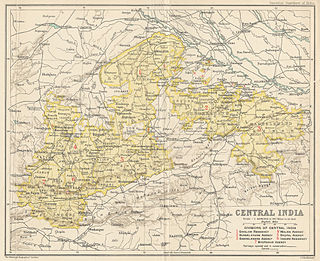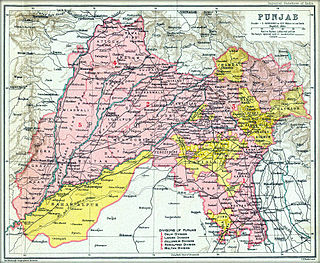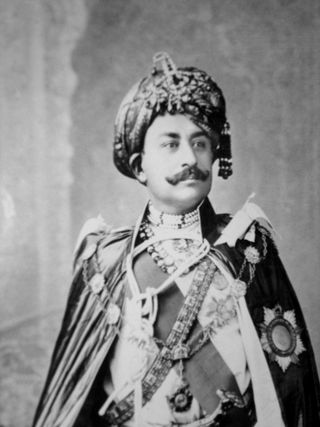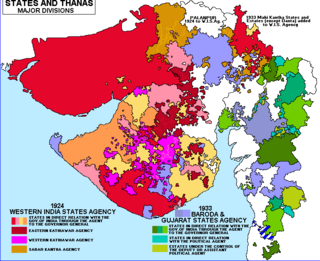
The Central Provinces and Berar was a province of British India and later the Dominion of India which existed from 1903 to 1950. It was formed by the merger of the Central Provinces with the province of Berar, which was territory leased by the British from the Hyderabad State. Through an agreement signed on 5 November 1902, 6th Nizam Mahbub Ali Khan, Asaf Jah VI leased Berar permanently to the British for an annual payment of 25 lakhs rupees. Lord Curzon decided to merge Berar with the Central Provinces, and this was proclaimed on 17 September 1903.

The Rajputana Agency was a political office of the British Indian Empire dealing with a collection of native states in Rajputana, under the political charge of an Agent reporting directly to the Governor-General of India and residing at Mount Abu in the Aravalli Range. The total area of the states falling within the Rajputana Agency was 127,541 square miles (330,330 km2), with eighteen states and two estates or chiefships.

The Central India Agency was created in 1854, by amalgamating the Western Malwa Agency with other smaller political offices which formerly reported to the Governor-General of India. The agency was overseen by a political agent who maintained relations of the Government of India with the princely states and influence over them on behalf of the Governor-General. The headquarters of the agent were at Indore.

Bhopawar Agency was a sub-agency of the Central India Agency in British India with the headquarters at the town of Bhopawar, so the name. Bhopawar Agency was created in 1882 from a number of princely states in the Western Nimar and Southern Malwa regions of Central India belonging to the former Bhil Agency and Bhil Sub-agency with the capitals at Bhopawar and Manpur. The agency was named after Bhopawar, a village in Sardarpur tehsil, Dhar District of present-day Madhya Pradesh state. Manpur remained a strictly British territory.

The Bhopal Agency was a section of British India's colonial Central India Agency, a British political unit which managed the relations of the British with a number of autonomous princely states existing outside British India.

The Eastern States Agency was an agency or grouping of princely states in eastern India, during the latter years of the Indian Empire. It was created in 1933, by the unification of the former Chhattisgarh States Agency and the Orissa States Agency; the agencies remained intact within the grouping. In 1936, the Bengal States Agency was added.

The Deccan States Agency, also known as the Deccan States Agency and Kolhapur Residency, was a political agency of India, managing the relations of the Government of India with a collection of princely states and jagirs in western India.
Malwa Agency was an administrative section of British India's Central India Agency. The headquarters of the political agent was at Mandsaur (Mandasor) / Neemuch (Nimach). The other chief towns of the region were : Ratlam and Jaora.

A salute state was a princely state under the British Raj that had been granted a gun salute by the British Crown ; i.e., the protocolary privilege for its ruler to be greeted—originally by Royal Navy ships, later also on land—with a number of cannon shots, in graduations of two salutes from three to 21, as recognition of the state's relative status. The gun-salute system of recognition was first instituted during the time of the East India Company in the late 18th century and was continued under direct Crown rule from 1858.

The Punjab States Agency was an agency of the British Raj. The agency was created in 1921, on the model of the Central India Agency and Rajputana Agency, and dealt with forty princely states in northwest India formerly dealt with by the Province of Punjab.

The Bundelkhand Agency was a political agency of the British Raj, managing the relations of the British government with the protected princely states of the Bundelkhand region.

Gwalior Residency was a political office in the British Indian Empire, which existed from 1782 until the British withdrawal from India in 1947.

Raja Raisal, reigned 1584 to 1614, He married Chauhan Rajput Princess Kisnavati Nirban, the only daughter of Raja Peetha Nirban of Khandela and thus, was also the 1st Shekhawat Raja of Khandela. Son of Maharao Suja of Amarsar, was granted the estate (jagir) of 7 villages in Lamiya on death of his father, thereupon he joined Imperial Service at Delhi where he was granted the title of "Raja" also a title of "Darbari" and a Mansab of 1250 sawars which was later raised to 3000 by Emperor Akbar. He died about 1614 in South India. He was great-grandson of MahaRao Shekha, King of Amarsar and he belonged to the Kachwaha Clan of Amber/Jaipur Royal Family. The Shekhawats ruled over the Shekhawati region for over 500 years and are honoured with the hereditary title of "Tazimi Sirdars", whom the Maharaja of Jaipur receives by rising from his seat.

Maharajadhiraj Mirza Maharao Sir Khengarji III Sawai Bahadur was a progressive and one of the longest ruling monarchs and also the longest ruling king of the Princely State of Kutch from 1875 to 1942.

Datia State was a princely state in subsidiary alliance with British India.

Bhor State was one of the 9-gun salute Maratha princely states of Deccan States Agency. It was the only state belonging to the Poona Agency under the Bombay Presidency, which became later part of the Deccan States Agency. Along with Akkalkot State, Aundh State, Phaltan State and Jath State, it was one of the Satara Jagirs. The state merged with the newly independent Indian union in 1948.

Alwar State was a kingdom from 1770 to 1818 and a princely state under British rule from 1818 to 1947. Initially its capital was Macheri and then the city of Alwar. The nobility of Alwar State belonged to the Naruka branch of the Kachwaha dynasty. The kingdom was established by Naruka chief Rao Raja Pratap Singh in 1770 CE. Alwar State was one of the 19 princely states of former-Rajputana, which existed at the time of Indian Independence. The last reigning ruler, Maharaja Sir Tej Singh Prabhakar Bahadur, signed the accession to the Indian Union on 7 April 1949.

Baroda and Gujarat States Agency was a political agency of British India, managing the relations of the British government of the Bombay Presidency with a collection of princely states.

The Baroda, Western India and Gujarat States Agency was an agency of the Indian Empire, managing the relations of the Provincial Government of the Bombay Presidency with a collection of princely states.